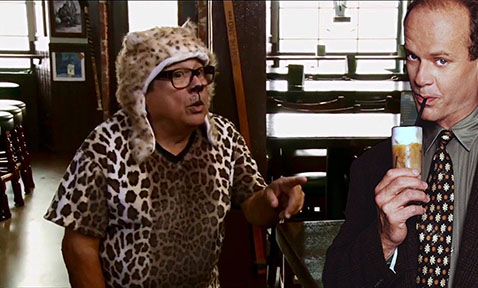It’s Always Sunny in Philadelphia is one of the best shows on television. It is the perfect send-up of televised situational comedy, applying real world rules to formulaic sitcom antics. Sitcom characters are monsters whose despicable behavior is normalized by their absurdist environment. The characters in Always Sunny follow sitcom rules, but they are a pathogen in an otherwise healthy and familiar world. The characters aren’t locked in stasis, as is the case with many episodic shows, but they don’t enjoy much personal growth either.
Always Sunny is a descent into madness and dysfunction. The gang’s charismatic leader/sociopath, Dennis, states that “We immediately escalate everything to a ten. It’s ridiculous. I mean, somebody comes in with some preposterous plan or idea. And then all of a sudden, everybody’s on the gas. Nobody’s on the brakes. Nobody’s thinking. Everybody’s just talking over each other with one idiotic idea after another. Until, finally, we find ourselves in a situation where we’ve broken into somebody’s house. And the homeowner is home.” The chaotic spectacle of plans gone awry while friends and family throw each other under the bus in a bid for self-preservation is a thing of beauty.

So why am I watching Frasier yet again?
The show is an intellectualized farce, or rather, it unravels pretentious snobbery into sideshow buffoonery. Frasier is defined by his hubris, and it is hard to stomach his many defeats without a certain sense of schadenfreude. The storytelling is patient and precise, building up toward a moment instead of garnering a bunch of cheap laughs. The acting is top-notch with comic timing that rarely misses a beat. Kelsey Grammar has a powerful stage presence, but he never overshadows his supporting cast. In fact, David Hyde Pierce was the driving force behind many of the best plot lines.
Most of all, this is my comfort show. Frasier has a warmth reminiscent of vinyl records or human voices and radio static on NPR. NewsRadio aired around the same time. Funny as it was, it never transcended the sitcom formula of canned laughter and pratfall gags. The audio grates a little as background noise, and the antics feel tired after repeat viewing (fun as it is to see Bob Odenkirk cast yet again as a lawyer in his cameo). Fraiser has the same canned laughter and is burdened by many of the tropes that it tries to transcend. It was a transitional show that elevated the format but never completely escaped its mooring in the formulaic storytelling of Cheers and Wings. The casual pacing was paired with a mellow atmosphere, bland jazz, and tasteful set design that imparted the aesthetic of the waiting room at a classy doctor’s office. That vibe could have been off-putting if it had been handled less adroitly, but the end product makes for great television and potent nostalgia.